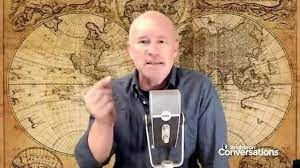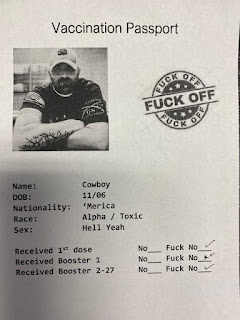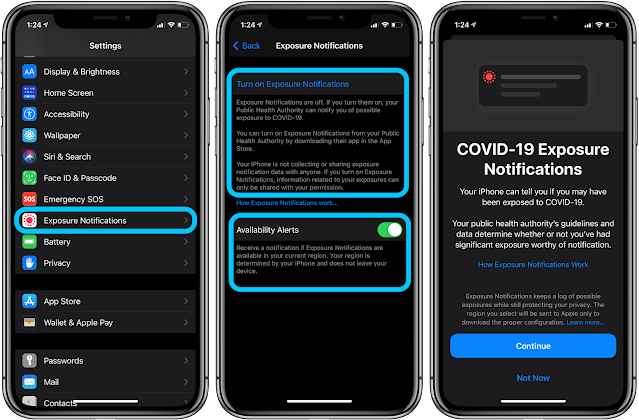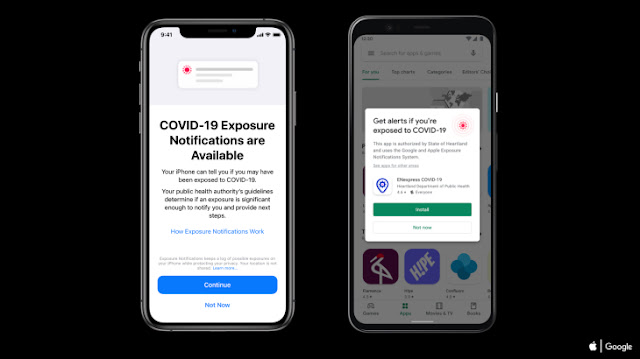List of Some COVID Lies Told by Government & WHO
Vax Pushing CEOs Are "Terrorist" Against Their Own Employees
Vaccine Passports Set the Stage for Increased Surveillance
Western Acceptance of The Deceptively Labeled "Vaccine Passport" Will Usher in The Global Enslavement of Mankind and Allow the Communist Dictator "State" To Decide Whether You Live or Die.
It’s likely only a matter of time before you’ll be asked to prove your vaccination status in order to carry on with your daily life.
Story at-a-glance:
The U.K. government has given sizable grants to a number of private companies developing vaccine passports and digital certificates that show vaccination status.
It’s likely only a matter of time before you’ll be asked to prove your vaccination status in order to carry on with your daily life.
This blatant move toward an ever-increasing surveillance state is being welcomed by many who have been led to believe they’re necessary to protect public health and safety.
In the U.S., universities continue to institute lockdowns for students, going so far as to ban even outdoor exercise.
While many countries have suggested that the COVID-19 vaccine will not be mandated, by giving special privileges to the vaccinated, such as the ability to travel, attend social events or even enter a workplace, it essentially amounts to the same thing and insinuates a “cleaner” class of people in those who have been vaccinated.
For a weary public longing to get back to normalcy, vaccine passports represent a tantalizing carrot, being dangled as a mechanism for freedom. By showing proof that you’ve received a COVID-19 vaccine, perhaps you can once again board an airplane and travel freely, attend a concert or enjoy a meal in your favorite restaurant, just like you used to.
Except, being required to present your “papers” in order to live your life isn’t actually freedom at all — it’s discrimination, and even a move toward technocratic fascism, one that’s setting the stage for increased surveillance and erosion of your privacy.
Nonetheless, this blatant move toward an ever-increasing surveillance state is being welcomed by many who have been led to believe the passports are necessary to protect public health and safety.
Vaccine passports are in development
It’s likely only a matter of time before you’ll be asked to prove your vaccination status in order to carry on with your daily life. “The government seems to be developing vaccine passports by stealth, making sure the technology is in place for anyone who needs it,” wrote Lara Prendergast, The Spectator’s assistant editor.
She’s referring to the U.K. government, which has given sizable grants to a number of private companies developing such technology. This includes more than $86,000 to Logifect, to create and launch a vaccine passport app, and more than $104,000 to iProov and Mvine, which are developing digital certificates that show vaccination status.
As Prendergast noted, “Your phone would most likely be your vaccination passport. Everyone’s vaccination status is already being logged centrally by the National Immunization Vaccination System using their NHS number. This information could be easily linked with an app.”
Around the world, vaccine passports are rapidly being rolled out, including in Denmark, which was one of the first to roll them out. As of September 2021, dozens of countries around the world have implemented vaccine passports, while in the U.S., plans for vaccine IDs are under evaluation. International efforts are also underway.
The Commons Project and the World Economic Forum created the Common Trust Network, which developed the CommonPass app that’s intended to act as a health passport.
The app allows users to upload medical data such as a COVID-19 test result or proof of vaccination, which then generates a QR code that you will show to authorities as your health passport.
The proposed common framework “for safe border reopening” around the world involves the following:
Every nation must publish their health screening criteria for entry into the country using a standard format on a common framework.
Each country must register trusted facilities that conduct COVID-19 lab testing for foreign travel and administer vaccines listed in the CommonPass registry.
Each country will accept health screening status from foreign visitors through apps and services built on the CommonPass framework.
Patient identification is to be collected at the time of sample collection and/or vaccination using an international standard.
The CommonPass framework will be integrated into flight and hotel reservation check-in processes.
Eventually, the CommonPass framework will be integrated with already existing personal health apps such as Apple Health and CommonHealth. If you want to travel, your personal health record will be evaluated and compared to a country’s entry requirements, and if you don’t meet them, you’ll be directed to an approved testing and vaccination location.
Majority are in favor of ‘privacy-encroaching technology’
Even as overall mortality data separating deaths “from” COVID and “with” COVID show COVID-19 is hardly the deadly pandemic it’s been made out to be, fear-mongering remains in full effect — including warnings on the more infectious, mutated strain of SARS-CoV-2, Delta.
With fear still omnipresent, acceptance of “privacy-encroaching technology” that promises an illusion of safety is high.
In the U.K., researchers from the University of Bristol conducted two large surveys about such technologies, with overwhelming positivity reported. The first measured public acceptance of location tracking through your cellphone that would allow health agencies to monitor your contact with others to target social distancing and quarantine measures.
About 70% of the respondents said they would accept such an app that they could choose to download and, surprisingly, 65% also said they would accept such an app even if it was mandated by the government and used to locate those violating lockdown orders and issue fines and arrests.
A second survey evaluated acceptance of vaccine passports, with 60% stating they were in favor and only 20% stating they were strongly opposed. The study’s lead author, professor Stephan Lewandowsky, described those opposed as “surprisingly low,” adding, “It’s fascinating how people seem increasingly receptive to their personal data being used to inform themselves and others about what they can and can’t do.”
Prendergast put this widespread acceptance into further context for the British, who “have traditionally been deeply suspicious of the idea of an official asking for ‘papers, please‘”:
“[This] … is why there was such a backlash against Blair’s ID cards. As one journalist at the time put it:
“’If I am ever asked to produce my ID card as evidence that I am who I say I am, when I have done nothing wrong and when I am simply ambling along and breathing God’s fresh air like any other freeborn Englishman, then I will take that card out of my wallet and physically eat it in the presence of whatever emanation of the state has demanded that I produce it.’
“That journalist is now our Prime Minister. It would be an extraordinary turn of events if Boris Johnson ended up being the man who introduced an immunity identity system in Britain.”
U.S. universities institute jail-like restrictions
At every turn, long-standing societal norms — like college students gathering with friends in their dorm or even leaving their rooms for work and exercise — are disappearing. As of Feb. 7, for instance, the University of Massachusetts Amherst was in a “high risk” operational mode due to a “continuing surge in COVID-19 cases.”
The status, which was to be in place for a minimum of 14 days, made all classes remote and ordered all students, whether residing on or off campus, to self-sequester in their residences, except to get meals, attend medical appointments or undergo twice-weekly COVID testing.
Violating these orders would result in “disciplinary action,” according to a university press release, which could include removal from residence halls or suspension. Students were also informed that, should they decide to leave campus to self-sequester at home, “it is highly unlikely we will be able to accommodate your return.”
Even within a residence hall, students were told to remain in their rooms at all times except when using a restroom on their floor. Outdoor exercise or attending to the immediate needs of a pet was allowed, but only when wearing a mask and maintaining social distancing.
This wasn’t the case at UC Berkeley, however, which banned outdoor exercise in addition to extending dormitory lockdowns in February 2021. The only times students were allowed to leave their rooms during the lockdown were to obtain medical care, get required COVID tests, use an assigned bathroom or to obtain food from an outdoor dining kiosk, after which they were required to return immediately to their rooms.
Are you clean enough to travel?
While many countries have suggested that the COVID-19 vaccine will not be mandated, by giving special privileges to the vaccinated, such as the ability to travel, attend social events or even enter a workplace, it essentially amounts to the same thing and insinuates a “cleaner” class of people in those who have been vaccinated.
It’s reminiscent of the early days of the pandemic, when hand sanitizer and disinfectant wipes were flying off store shelves in a frenzy to clean away COVID. Now we know that transmission of COVID-19 by fomites — the term used for inanimate surfaces and objects that can transmit a pathogen — has been exaggerated.
Emanuel Goldman, a microbiology professor at Rutgers New Jersey Medical School, suggested this in July 2020, when he stated that studies suggesting SARS-CoV-2 was easily spread via surfaces did not present real-life situation.
“In my opinion, the chance of transmission through inanimate surfaces is very small,” he said, and while period disinfection of surfaces, especially in hospitals, was a reasonable precaution, in public settings, he noted, “this can go to extremes not justified by the data.”
In February 2021, an editorial in Nature supported Goldman’s work, suggesting that costly and toxic disinfection efforts are misguided.
“Catching the coronavirus from surfaces is rare. The World Health Organization and national public health agencies need to clarify their advice,” the editorial reads. Yet, the New York City Metropolitan Transit Authority alone is spending an estimated $380 million annually on COVID-related sanitation, and when it asked the U.S. government whether they should be focusing on fomites or solely aerosols, they were told to continue their focus on fomites.
Writing in The Atlantic, Derek Thompson describes this as a type of “hygiene theater,” in which Americans are going through the motions of dutifully cleaning and, likely, over-disinfecting surfaces when the virus spreads most efficiently through the air.
Indeed, much of the COVID-19 pandemic response has been embroiled in theatrics, including mask mandates, for which the scientific evidence has been described as “astonishingly weak.”
Hygiene theater, much like the theater for vaccine passports, provides an illusion of safety, not one grounded in reality.
In China, This Coronavirus App Pretty Much Controls Your Life
How The Coronavirus Is Being Used As A Trojan Horse
- 120 contact tracing apps are available in 71 countries
- 45 apps now use Google and Apple’s API
- The U.S. has 23 apps, more than any other country in the world
- 19 apps, with 4 million downloads combined, have no privacy policy
- 60 digital tracking measures have been introduced in 38 countries
- Telecom providers have shared user data in 20 countries
- 43 physical surveillance measures have been adopted in 27 countries
- Drones have been used 22 countries to help enforce lockdowns
- Europe introduced more surveillance measures than any other region
Beware of this Fake COVID-19 Tracking App
Mobile phone tracking applications are now often encouraged or even mandatory to use in many countries, and therefore have a high number of users. With that, many malicious applications resembling official versions of these tracking applications have begun to appear. Mostly, with the intention to steal sensitive information from users.
With the sudden spread of COVID-19, the need for some tools that would help trace contact between people quickly arose. The purpose of tracking applications is to use smartphones as a tool to track interactions between people in order to provide information to users if they have come in contact or have been in close proximity, to a person confirmed positive of infection with the virus.
Here is a link to more detail.
Contact Tracing Legitimate or a Scam?
You’ve probably been hearing a lot about contact tracing. It’s the process of identifying people who have come in contact with someone who has tested positive for COVID-19, instructing them to quarantine and monitoring their symptoms daily.
If you’re contacted about possible exposure to the coronavirus, make sure it’s legit. Scammers are masquerading as contact tracers, and it’s smart to verify calls or texts before giving out any information.
A tracer’s job is to help contain the pandemic by reaching out to people who may be spreading the coronavirus. You could be called because your test was positive. Or perhaps someone who tested positive named you as someone they’d been in contact with, and now you need to be tested.
Scammers read the news, too, and are trying to capitalize on tracing campaigns. They’ve even made calls appear to come from the U.S. Department of Health and Human Services. And yet actual tracers can’t do their work if we won’t pick up the phone.
Contact tracers are usually hired by a state’s department of public health. They work with an infected person to get the names and phone numbers for everyone that infected person came in close contact with while the possibly infectious. Those names and phone numbers are often kept in an online system. People who had contact with someone infected with COVID-19 may first get a text message from the health department, telling them they’ll get a call from a specific number. The tracer who calls will not ask for personal information, like a Social Security number. At the end of the call, some states ask if the contact would like to enroll in a text message program, which sends daily health and safety reminders until the 14-day quarantine ends. But tracers won’t ask you for money or information like your Social Security, bank account, or credit card number. Anyone who does is a scammer.
Popular Posts (All Time)
-
Table of Contents Introduction: Stress, Smoking, and Health The Normotim Effect: A New Hope in Stress Management Lithium Ascorbate:...
-
The coronavirus disease (COVID-19) pandemic has been linked to mental health issues related to disease-induced morbidity and mortality and p...
-
A group of virologists in February 2020 published a letter in The Lancet stating they “overwhelmingly conclude that this coronavirus origina...
-
Former Hunter Biden business partner Tony Bobulinski has confirmed that an email published in the New York Post's bombshell exposé is i...
-
SAMPLE LETTER BELOW 🚨🚨🚨 The secret is NOT to refuse the Jabb.... From a lawyer: If you are being forced to Vax in order to keep your job,...
-
The time is now. As most readers of this substack are now well aware, this is not just about COVID. The Constitution hangs in the balance. P...
-
Comment to ACIP meeting of August 30, 2021 submitted by Steve Kirsch - Executive Director of the COVID-19 Early Treatment Fund stk@treatearl...
-
Klaus Schwab's World Economic Forum Government & WHO Lies Tucker & Malone Discuss The World Economic Forum & It's Young ...
-
2 Sources for this story below . . . Justin Bieber reveals he has Ramsay Hunt syndrome Twitter suspended the VaccineTruth2 account Want to ...
-
Crimes Against Humanity - The PCR Test Fraud and COVID-19 will be the Case of the Century Reiner Fuellmich - Update on Court Case & P...





















